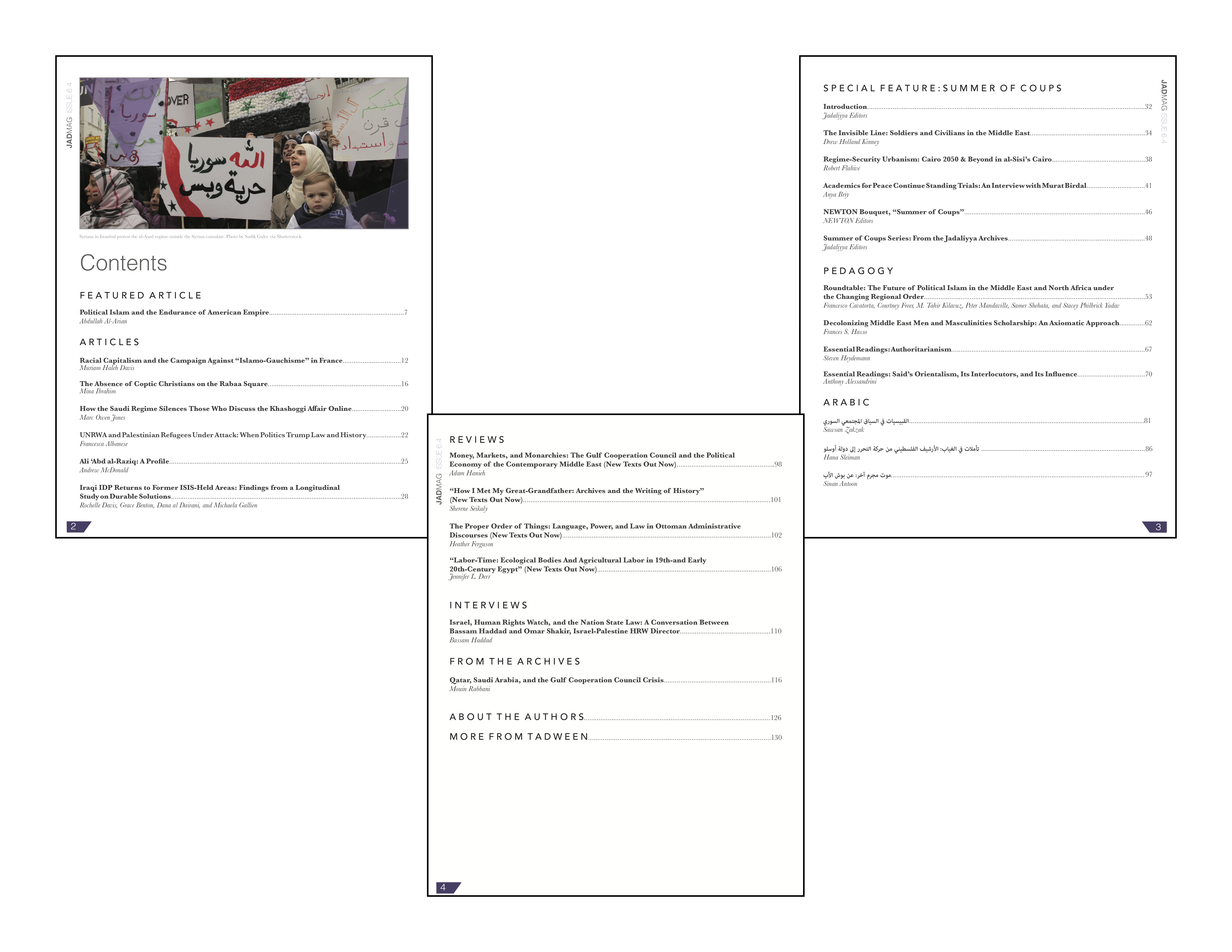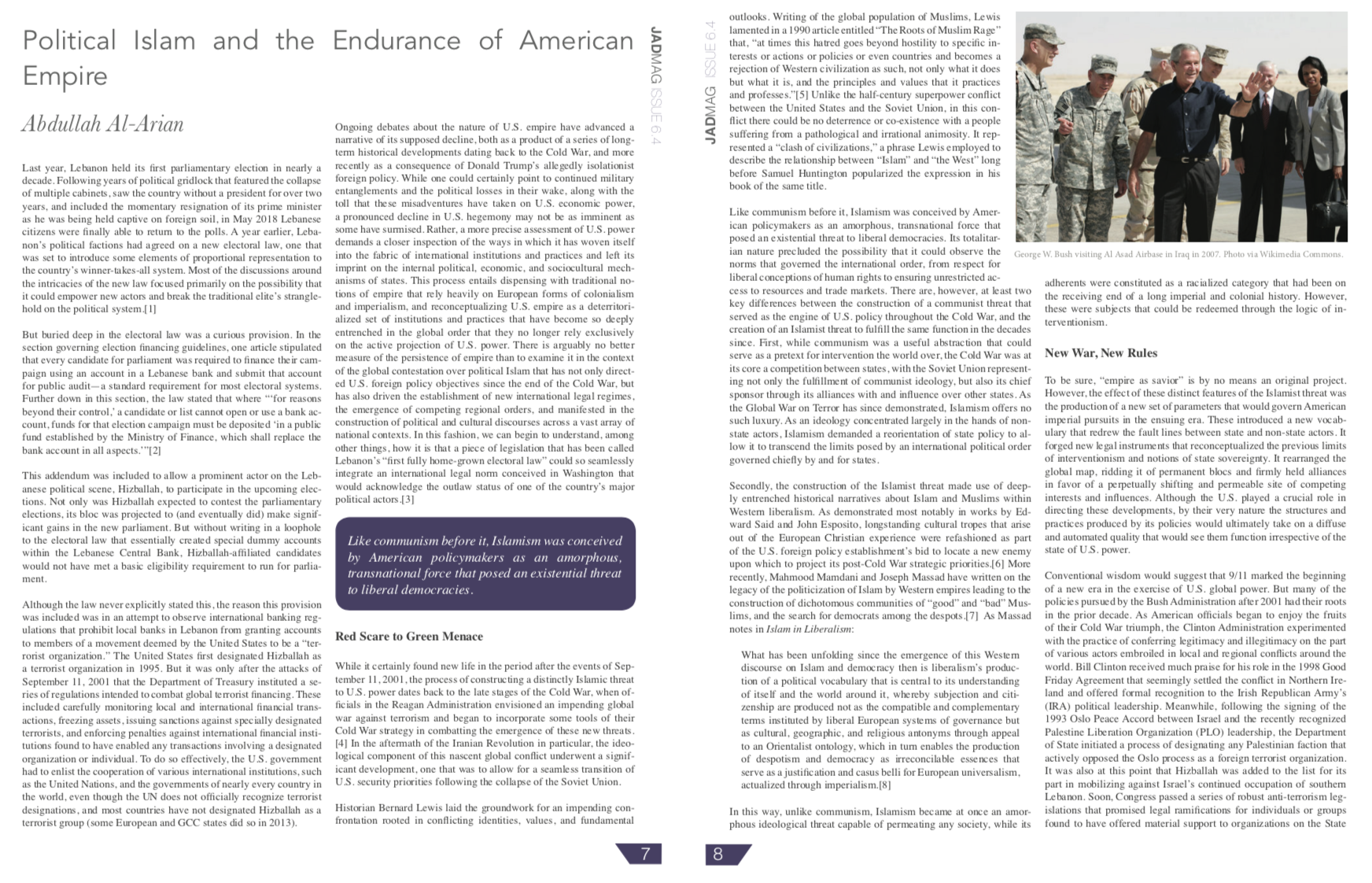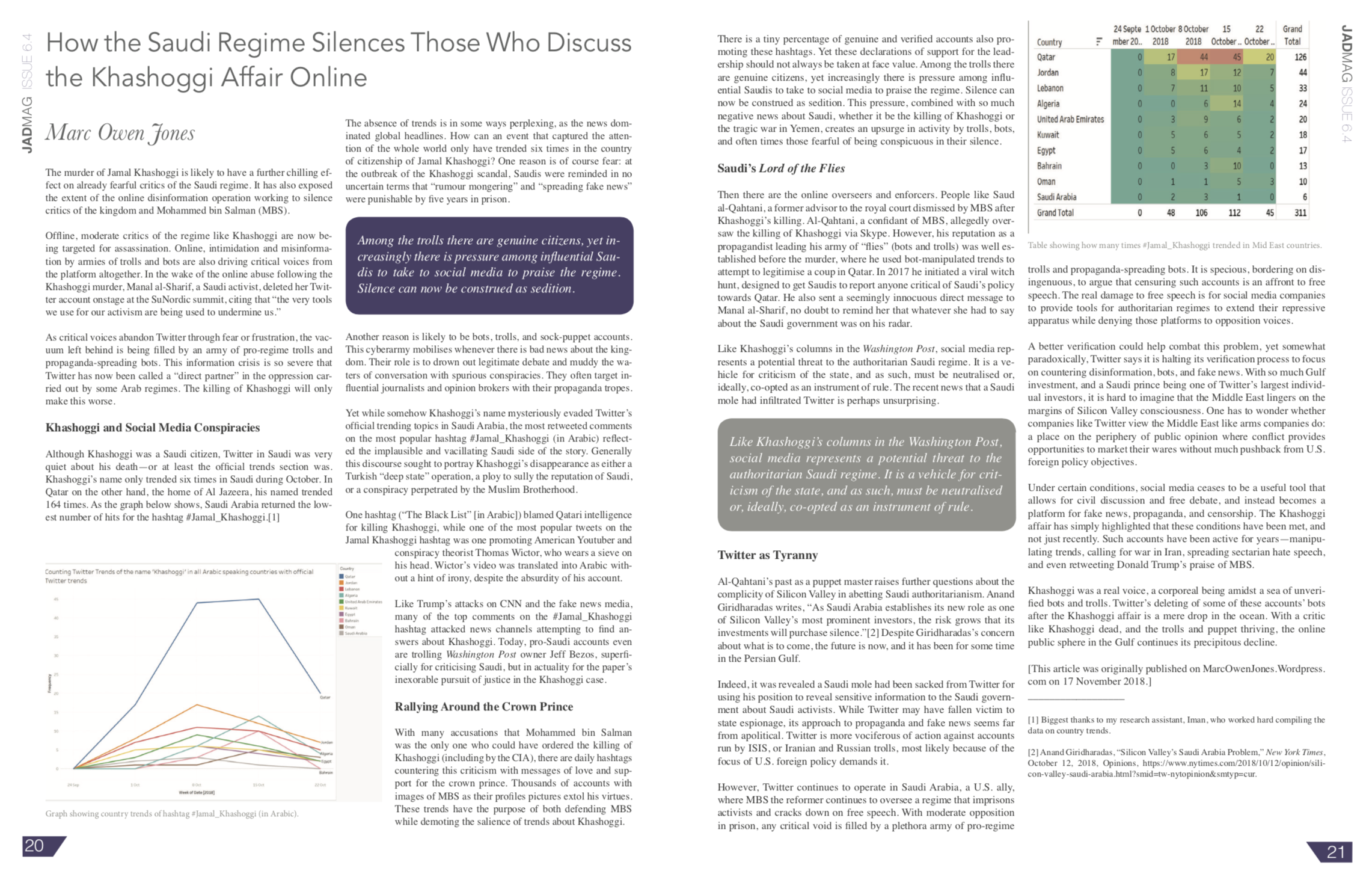The newest issue of the JadMag Subscription is out! JadMag subscription service entitles the subscriber to four issues.
Each JadMag will feature diverse content and offer unique articles or interviews that will not be found on Jadaliyya at the time of publication. Coupling timely content with the addition of essential readings lists, reviews of new books and scholarly articles, and topical pieces from Jadaliyya’s celebrated archives allows the JadMag project more ambitiously to function as a knowledge producer, a near-comprehensive source of analysis on the region, and a pedagogical resource par excellence.
Each subscription to the print issue comes with digital copies. Electronic-only subscriptions are also available. We are currently on "Issue 6.4: Fall 2018"
If you order a one-year subscription now, you will receive:
- Issue 6.2: Spring 2018
- Issue 6.4: Fall 2018
- One topical issue, to be released Summer 2019.
- One back issue of your choice, selected here: https://tadweenpublishing.com/collections/jadmag
- And a special bonus! A complimentary E-Copy of the Cities JadMag!
See details on pricing by visiting the JadMag subscription page here.
_____________________
Preview of Featured Article:
Political Islam and the Endurance of American Empire
by Abdullah Al-Arian
Last year, Lebanon held its first parliamentary election in nearly a decade. Following years of political gridlock that featured the collapse of multiple cabinets, saw the country without a president for over two years, and included the momentary resignation of its prime minister as he was being held captive on foreign soil, in May 2018 Lebanese citizens were finally able to return to the polls. A year earlier, Lebanon’s political factions had agreed on a new electoral law, one that was set to introduce some elements of proportional representation to the country’s winner-takes-all system. Most of the discussions around the intricacies of the new law focused primarily on the possibility that it could empower new actors and break the traditional elite’s stranglehold on the political system.
But buried deep in the electoral law was a curious provision. In the section governing election financing guidelines, one article stipulated that every candidate for parliament was required to finance their campaign using an account in a Lebanese bank and submit that account for public audit—a standard requirement for most electoral systems. Further down in this section, the law stated that where “‘for reasons beyond their control,’ a candidate or list cannot open or use a bank account, funds for that election campaign must be deposited ‘in a public fund established by the Ministry of Finance, which shall replace the bank account in all aspects.’”
This addendum was included to allow a prominent actor on the Lebanese political scene, Hizballah, to participate in the upcoming elections. Not only was Hizballah expected to contest the parliamentary elections, its bloc was projected to (and eventually did) make significant gains in the new parliament. But without writing in a loophole to the electoral law that essentially created special dummy accounts within the Lebanese Central Bank, Hizballah-affiliated candidates would not have met a basic eligibility requirement to run for parliament.
Although the law never explicitly stated this, the reason this provision was included was in an attempt to observe international banking regulations that prohibit local banks in Lebanon from granting accounts to members of a movement deemed by the United States to be a “terrorist organization.” The United States first designated Hizballah as a terrorist organization in 1995. But it was only after the attacks of September 11, 2001 that the Department of Treasury instituted a series of regulations intended to combat global terrorist financing. These included carefully monitoring local and international financial transactions, freezing assets, issuing sanctions against specially designated terrorists, and enforcing penalties against international financial institutions found to have enabled any transactions involving a designated organization or individual. To do so effectively, the U.S. government had to enlist the cooperation of various international institutions, such as the United Nations, and the governments of nearly every country in the world, even though the UN does not officially recognize terrorist designations, and most countries have not designated Hizballah as a terrorist group (some European and GCC states did so in 2013).
See a peek here.
_____________________
Table of Contents
F E A T U R E D A R T I C L E
Political Islam and the Endurance of American Empire | 7
Abdullah Al-Arian
A R T I C L E S
Racial Capitalism and the Campaign Against “Islamo-Gauchisme” in France | 12
Muriam Haleh Davis
The Absence of Coptic Christians on the Rabaa Square | 16
Mina Ibrahim
How the Saudi Regime Silences Those Who Discuss the Khashoggi Affair Online | 20
Marc Owen Jones
UNRWA and Palestinian Refugees Under Attack: When Politics Trump Law and History | 22
Francesca Albanese
Ali ‘Abd al-Raziq: A Profile | 25
Andrew McDonald
Iraqi IDP Returns to Former ISIS-Held Areas: Findings from a Longitudinal Study on Durable Solutions | 28
Rochelle Davis, Grace Benton, Dana al Dairani, and Michaela Gallien
S P E C I A L F E A T U R E : S U M M E R O F C O U P S
Introduction | 32
Jadaliyya Editors
The Invisible Line: Soldiers and Civilians in the Middle East | 34
Drew Holland Kinney
Regime-Security Urbanism: Cairo 2050 & Beyond in al-Sisi’s Cairo | 38
Robert Flahive
Academics for Peace Continue Standing Trials: An Interview with Murat Birdal | 41
Anya Briy
NEWTON Bouquet, “Summer of Coups” | 46
NEWTON Editors
Summer of Coups Series: From the Jadaliyya Archives | 48
Jadaliyya Editors
P E D A G O G Y
Roundtable: The Future of Political Islam in the Middle East and North Africa under the Changing Regional Order | 60
Francesco Cavatorta, Courtney Freer, M. Tahir Kilavuz, Peter Mandaville, Samer Shehata, and Stacey Philbrick Yadav
Decolonizing Middle East Men and Masculinities Scholarship: An Axiomatic Approach | 62
Frances S. Hasso
Essential Readings: Authoritarianism | 67
Steven Heydemann
Essential Readings: Said’s Orientalism, Its Interlocutors, and Its Influence | 70
Anthony Alessandrini
A R A B I C
81 | القبيسيات في السياق المجتمعي السوري - الجزء الثاني
Sawsan Zakzak سوسن زكزك
86 | تأملات في الغياب: الأرشيف الفلسطيني من حركة التحرر إلى دولة أوسلو - الجزء الثاني
Hana Sleiman هنا سليمان
97 | موت مجرم آخر: عن بوش الأب
Sinan Antoon سنان انطون
R E V I E W S
Money, Markets, and Monarchies: The Gulf Cooperation Council and the Political Economy of the Contemporary Middle East (New Texts Out Now) | 98
Adam Hanieh
“How I Met My Great-Grandfather: Archives and the Writing of History” (New Texts Out Now) | 101
Sherene Seikaly
The Proper Order of Things: Language, Power, and Law in Ottoman Administrative Discourses (New Texts Out Now) | 102
Heather Ferguson
“Labor-Time: Ecological Bodies And Agricultural Labor in 19th-and Early 20th-Century Egypt” (New Texts Out Now) | 106
Jennifer L. Derr
I N T E R V I E W S
Israel, Human Rights Watch, and the Nation State Law: A Conversation Between Bassam Haddad and Omar Shakir, Israel-Palestine HRW Director | 110
Bassam Haddad
F R O M T H E A R C H I V E S
Qatar, Saudi Arabia, and the Gulf Cooperation Council Crisis | 116
Mouin Rabbani
A B O U T T H E A U T H O R S | 126
M O R E F R O M T A D W E E N | 130
_____________________


